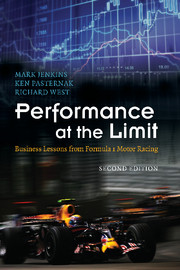Book contents
- Frontmatter
- Contents
- List of figures
- List of tables
- List of plates
- Acknowledgements
- Note on the reference system
- The Grand Prix experience
- 1 Introduction
- 2 Why Formula 1 motor racing?
- 3 The performance framework
- 4 The war for talent
- 5 Winning through teamwork
- 6 Capability through partnerships
- 7 The high-performance organisation
- 8 Integrating
- 9 Innovating
- 10 Transforming
- 11 Achieving and sustaining performance
- 12 Twelve business lessons from Formula 1 motor racing
- Appendix A Grand Prix Champions 1950–2008
- Appendix B Grand Prix Graveyard 1950–2008
- Appendix C Interview respondents
- References
- Index
- Plate section 1
- Plate section 2
4 - The war for talent
the people of Formula 1
Published online by Cambridge University Press: 05 August 2013
- Frontmatter
- Contents
- List of figures
- List of tables
- List of plates
- Acknowledgements
- Note on the reference system
- The Grand Prix experience
- 1 Introduction
- 2 Why Formula 1 motor racing?
- 3 The performance framework
- 4 The war for talent
- 5 Winning through teamwork
- 6 Capability through partnerships
- 7 The high-performance organisation
- 8 Integrating
- 9 Innovating
- 10 Transforming
- 11 Achieving and sustaining performance
- 12 Twelve business lessons from Formula 1 motor racing
- Appendix A Grand Prix Champions 1950–2008
- Appendix B Grand Prix Graveyard 1950–2008
- Appendix C Interview respondents
- References
- Index
- Plate section 1
- Plate section 2
Summary
I am a person who is positive inside, so I don’t want to reflect any negativity outside, even if we are working in a war.
Stefano Domenicali – Racing Management General Director, Scuderia FerrariStefano Domenicali is one of a new breed of team principal, having at the end of 2007 formally taken over from Jean Todt as the head of Gestione Sportiva (GS) – Ferrari’s Formula 1 operation. In saying the above Domenicali was reflecting on a broader question about his leadership style, but his reference to a ‘war’ was not by accident, especially as he added:
… that’s a word I do not like to use too much, to be honest, as it is done with so many things that are not really part of my lifestyle or character.
The battle on the track is happening alongside the continuing struggle to find, nurture and retain top talent, which is so very much the daily challenge experienced by all businesses. In this chapter we will take a look at the people who populate this sport: the team principals at the top of these organisations, Formula 1 people in general, and Formula 1 drivers. In this second edition we have expanded our examination of drivers, about whom we usually receive the most questions during our speaking and teaching engagements. We will consider their competitive drive and work ethic, physical conditioning, driving skills, ability to work under pressure, and the communication skills required of them in today’s racing and commercial environment.
- Type
- Chapter
- Information
- Performance at the LimitBusiness Lessons from Formula 1 Motor Racing, pp. 39 - 66Publisher: Cambridge University PressPrint publication year: 2009



